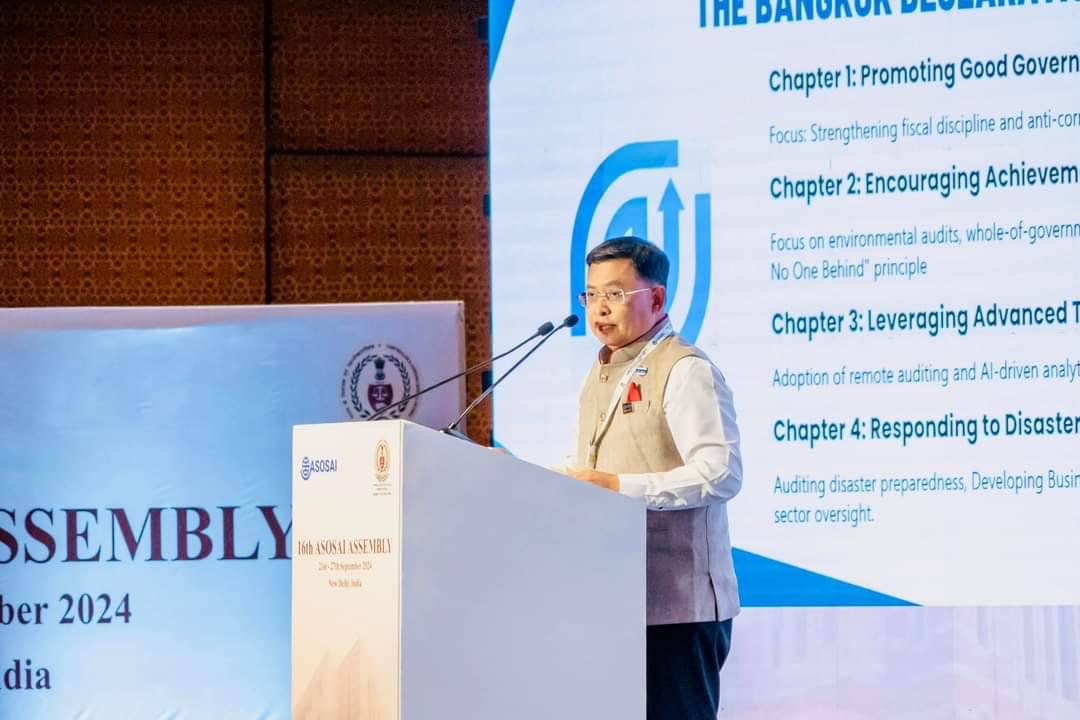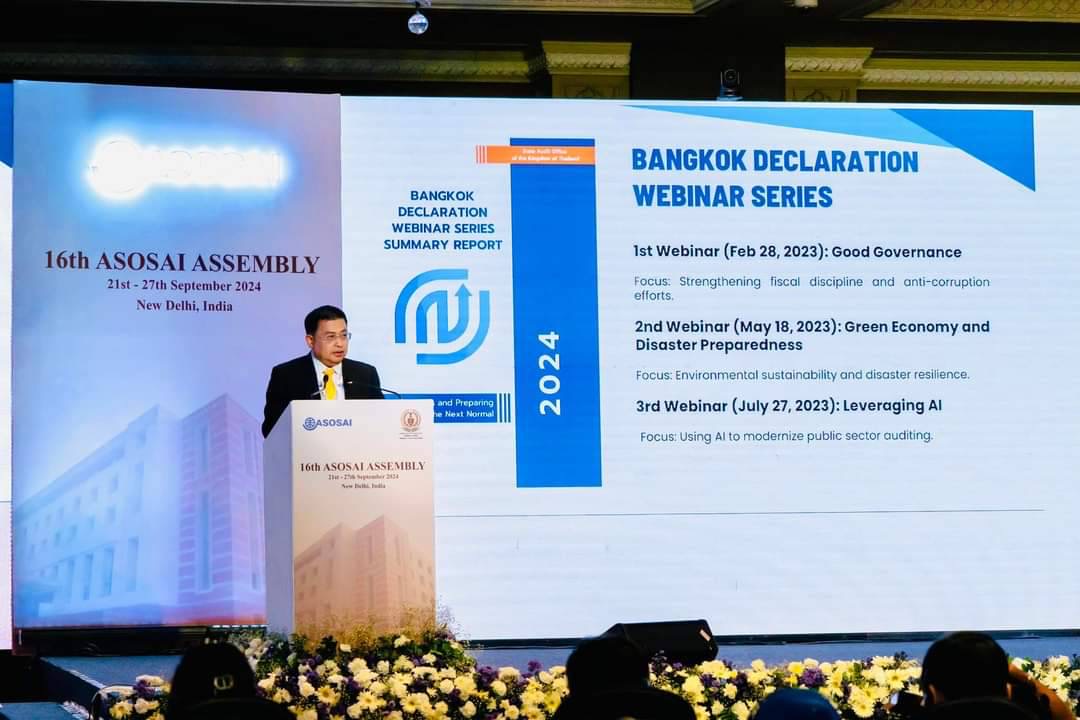The unprecedented challenges posed by the COVID-19 pandemic have necessitated a reimagining of governance structures worldwide. As we transition into what is termed the 'Next Normal,' the imperative for robust governance mechanisms has never been more pronounced. Good governance serves as the bedrock for transparency, accountability, and the restoration of public trust—elements crucial for societal resilience in the face of ongoing and future crises.
Supreme Audit Institutions (SAIs) stand at the forefront of this transformative period. By diligently auditing public resources and ensuring fiscal discipline, SAIs play a key role in fostering transparency and combating corruption. Their independent oversight not only enhances public confidence in governmental institutions but also promotes efficient resource management—a necessity in these uncertain times.
The 'Next Normal' and the Imperative of Good Governance
The 'Next Normal' means the post-pandemic landscape characterized by rapid digital transformation, heightened public scrutiny, and evolving governance challenges. The pandemic has exposed vulnerabilities within institutional frameworks, underscoring the need for adaptability and resilience.
Good governance emerges as a cornerstone in navigating this new terrain. Strengthening institutional capacities and oversight mechanisms is essential for effective resource allocation and crisis management. Transparency and accountability must be elevated to restore and maintain public trust, ensuring that governmental responses are both effective and equitable.
---
The Evolving Role of SAIs in the 'Next Normal'
SAIs are entrusted with the core function of auditing government spending, thereby promoting accountability and detecting fraud and corruption through independent oversight. In the 'Next Normal,' SAIs are adapting to new challenges by embracing digital tools and methodologies. Remote audits and electronic data analysis have become indispensable in maintaining the continuity of oversight functions amidst restrictions on physical interactions.
The agility of SAIs in adopting these innovations enhances their capacity to ensure the efficient use of public funds, especially during crises where rapid governmental response is required. By upholding fiscal discipline and transparency, SAIs contribute significantly to the stability and integrity of public financial management systems.
---
The Bangkok Declaration 2021: A Strategic Framework for SAIs
At the 16th ASOSAI Assembly, Mr. Monthien Charoenpol, the Auditor General of Thailand, reported on the achievements of the Bangkok Declaration 2021. Under the chairmanship of the State Audit Office (SAO) of Thailand during 2021–2024, significant progress has been made in driving the initiatives outlined in the Declaration. The collaborative efforts among SAIs have strengthened regional anti-corruption measures and enhanced the effectiveness of oversight functions in the 'Next Normal.'
The Bangkok Declaration 2021 represents a strategic response to the multifaceted challenges introduced by the pandemic. It provides a comprehensive framework for SAIs to operate effectively within the 'Next Normal,' emphasizing the need for leveraging technology and strengthening regional cooperation.
The Declaration outlines the 'Next Normal' approach through three key pillars:
1. Resolve: Immediate and decisive actions to address health crises, including the utilization of remote work capabilities and tele-auditing to continue essential oversight functions.
2. Resilience: Preparing for and mitigating economic and fiscal challenges by reinforcing institutional capacities and fostering adaptability.
3. Rethinking: Embracing agility, flexibility, and innovation to ensure continuous operation and responsiveness during crises.
---
Core Tenets of the Bangkok Declaration 2021
The Declaration is structured around four chapters:
1. Promoting Good Governance: SAIs are called upon to enhance fiscal discipline and support good governance practices. This involves proactive engagement with anti-corruption bodies and the promotion of transparent public financial management.
2. Supporting Sustainable Development Goals (SDGs): SAIs play an important role in auditing the implementation of SDGs, ensuring that efforts toward sustainability and inclusivity are on track. Collaboration with multiple stakeholders is essential to this endeavor.
3. Leveraging Advanced Technologies: The adoption of advanced technologies, such as e-governance platforms and digital auditing tools, is encouraged to improve efficiency and effectiveness in public auditing. Innovation through technology sharing and collaboration among SAIs is important.
4. Responding to Disasters and Pandemics: The Declaration emphasizes the importance of cooperative auditing in disaster management and the development of business continuity plans to enhance preparedness for future crises.
---
Enhancing Regional Anti-Corruption Collaboration
The Bangkok Declaration underscores the necessity of regional cooperation among SAIs to combat corruption effectively. By fostering partnerships and sharing best practices, SAIs can strengthen their oversight capabilities and address corruption risks that transcend national boundaries.
The AIR Model—Adaptive, Innovative, and Responsive—serves as a guiding framework:
- Adaptive: SAIs must adjust to evolving governance challenges by adopting flexible auditing processes and methodologies.
- Innovative: Embracing new technologies enhances the capacity of SAIs to conduct thorough and timely audits.
- Responsive: Rapid response to emerging corruption risks is crucial, necessitating collaboration with regional agencies and stakeholders.
---
Challenges and Policy Recommendations
While the path forward is clear, SAIs face several challenges:
- Political Interference: Ensuring the independence of SAIs is essential for unbiased auditing and oversight.
- Resource Limitations: Adequate funding and human resources are necessary to carry out comprehensive audits, especially with the expanded scope in the 'Next Normal.'
- Technological Gaps: Disparities in technological capabilities can hinder the effectiveness of SAIs in some regions.
To address these challenges, the following policy recommendations are proposed:
1. Strengthening Institutional Capacity: Safeguard the independence of SAIs through legal and institutional reforms, ensuring they can operate without undue influence.
2. Promoting Fiscal and Financial Discipline: Implement policies that enhance economic stability and allow SAIs to function effectively.
3. Enhancing Adaptability through the AIR Model: Encourage SAIs to be adaptive, innovative, and responsive to new challenges by integrating advanced technologies and flexible practices.
4. Fostering Collaboration: Strengthen partnerships between SAIs and anti-corruption agencies to create a unified front against corruption.
---
Call to Action
- Support from Regional Governments: It is imperative that governments recognize and bolster the crucial work of SAIs by providing necessary support and resources.
- Continued Collaboration: SAIs must continue to collaborate regionally and internationally to strengthen governance, accountability, and transparency in the post-pandemic world.
By embracing these initiatives, we can collectively work towards a future where good governance prevails, corruption is mitigated, and public trust is restored. The journey ahead requires commitment, innovation, and collaboration, but the potential benefits for societies globally are immeasurable.
Dr. Sutthi Suntharanurak
3 Oct 2024
#Advisor Outlook (Eng) Vol.1


